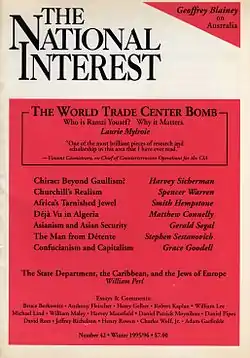The National Interest
The National Interest (TNI) is an American bimonthly conservative international affairs magazine edited by American journalist Jacob Heilbrunn and published by the Center for the National Interest, a public policy think tank based in Washington D.C. that was established by former U.S. President Richard Nixon in 1994 as the Nixon Center for Peace and Freedom.
 Winter 1995/96 cover | |
| Editor | Jacob Heilbrunn (since July 2013) |
|---|---|
| Executive Editor | Harry Kazianis (since July 2013) |
| Categories | International affairs |
| Frequency | Bi-monthly |
| Publisher | Dimitri Simes |
| Founder | Irving Kristol |
| Year founded | 1985 |
| First issue | 1985 |
| Company | National Affairs, Inc. (1985–2001) Center for the National Interest (2001–present) |
| Country | United States |
| Based in | Washington DC |
| Website | nationalinterest |
| ISSN | 0884-9382 |
The magazine is associated with the realist school of foreign policy thought.[1] It was founded in 1985 by Irving Kristol and until 2001 was edited by Australian academic Owen Harries.[1]
History
Founded in 1985 by American columnist and neoconservatism advocate Irving Kristol, the magazine was until 2001 edited by Australian academic Owen Harries.[1]
In 2001, The National Interest was acquired by The Center for the National Interest, a public policy think tank based in Washington D.C. that was established by former U.S. President Richard Nixon on January 20, 1994 as the Nixon Center for Peace and Freedom.[2] Nixon's handpicked executive and current president, Dimitri Simes, was named in the Mueller Report as one of the “links” between Donald Trump Campaign officials and individuals with ties to the Russian government.[3]
In 2005, ten editors of The National Interest resigned due to different viewpoints regarding the magazines acquisition and with the larger editorial board. Those who left founded a separate journal, The American Interest.[4]
Influence and reception
The National Interest is credited with introducing ideas like "the West and the rest" and geoeconomics into public discourse.[4] Political scientist Francis Fukuyama formulated his early political and philosophical thoughts on the end of history in the journal, where he argued that the worldwide spread of liberal democracies and free-market capitalism of the West and its lifestyle may signal the end point of humanity's sociocultural evolution and become the final form of human government.[5]
In 2013, RealClearWorld named The National Interest one of its top world opinion websites.[6]
Writing in Politico, journalist James Kirchick argued in 2016 while commenting on Donald Trump's Russian relationships that The National Interest and its parent company "are two of the most Kremlin-sympathetic institutions in the nation’s capital, even more so that the Carnegie Moscow Center."[7]
See also
- The American Interest, founded in 2005 by former members of the TNI editorial board
- National Affairs
- Coalition for a Realistic Foreign Policy
- Timeline of Russian interference in the 2016 United States elections
References
- "The National Interest". Library of Congress. Retrieved February 20, 2020.
- The Nixon Center: Mission statement Archived October 14, 2008, at the Wayback Machine
- Mueller Report, vol. I, p. 103: "Dimitri Simes and the Center for the National Interest."
- Kirkpatrick, David D. (March 13, 2005). "Battle Splits Conservative Magazine". The New York Times. ISSN 0362-4331. Retrieved September 10, 2020.
- Fukuyama, Francis (1989). "The End of History?". The National Interest (16): 3–18. ISSN 0884-9382. JSTOR 24027184.
- CST, Posted on 12 15 13 8:22 PM. "RealClearPolitics - The National Interest". www.realclearworld.com. Retrieved November 14, 2020.
- Kirchick, James (April 27, 2016). "Donald Trump's Russia connections". POLITICO. Retrieved September 10, 2020.